Today, privacy compliance stands as more than a legal obligation, it forms the foundation of customer trust. Laws such as GDPR, CCPA, and new global regulations push businesses to adopt strong software tools that help them meet strict requirements. The right privacy compliance software turns complex regulations into clear, automated tasks. These tools actively discover and map data to show where personal information sits across systems, manage user consent by recording permissions and preferences, and handle data subject rights by processing requests for deletion or access.
Here, we highlight the top 10 privacy compliance software solutions in 2025.
Top 10 Best Privacy Compliance Software
1. OneTrust
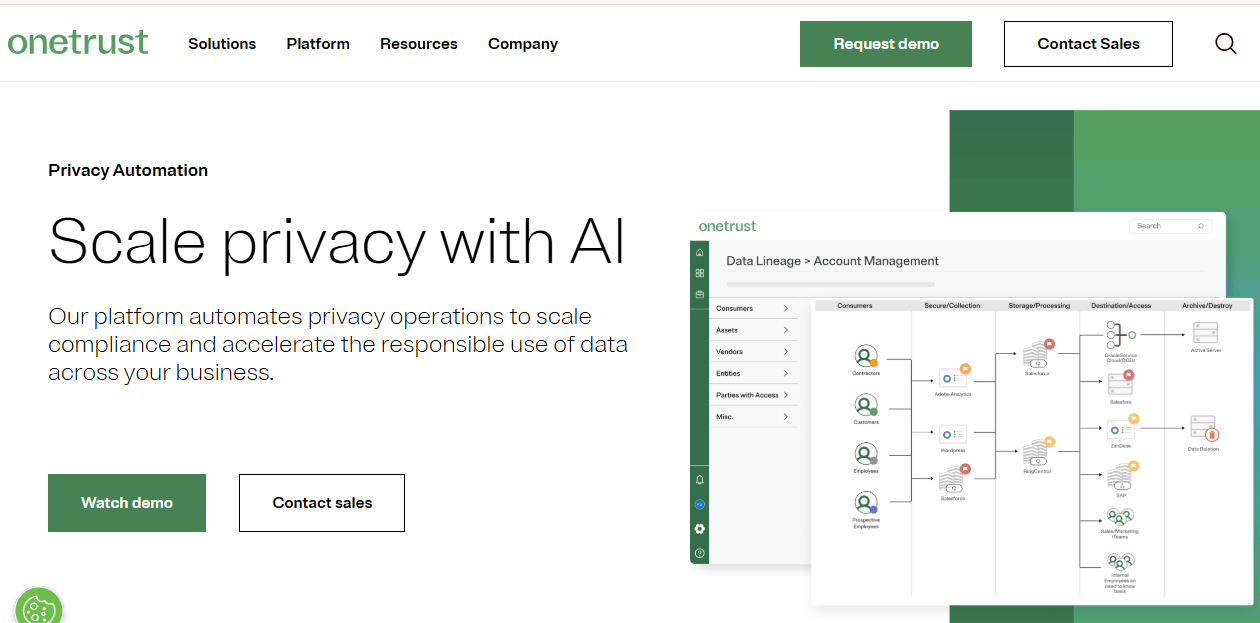
OneTrust Privacy Automation enables enterprises to automate privacy compliance workflows such as Data Subject Request (DSR) fulfillment, data mapping, and regulatory tracking from a single platform. Organizations use it to build intelligent, scalable privacy programs instead of reacting to compliance challenges. The solution combines real-time regulatory intelligence, advanced data discovery, and AI-powered workflows to keep privacy operations accurate and up to date.
Features
- Supports GDPR and CCPA compliance requirements
- Automates DPIA workflows and risk assessments
- Monitors vendor risk and manages third-party relationships
- Maps and classifies data across systems
- Manages consent across multiple user touchpoints
- Integrates with existing governance programs
Pros
- Offers one of the most comprehensive privacy platforms available
- Delivers strong regulatory compliance capabilities
- Provides excellent vendor and third-party integrations
- Includes robust automated workflow features
Cons
- Costs may be high for smaller organizations
- Implementation and setup can be complex
- Features may exceed the needs of simpler privacy programs
- Requires dedicated resources to manage effectively
Pricing
- Contact vendor for a quote
2. Collibra
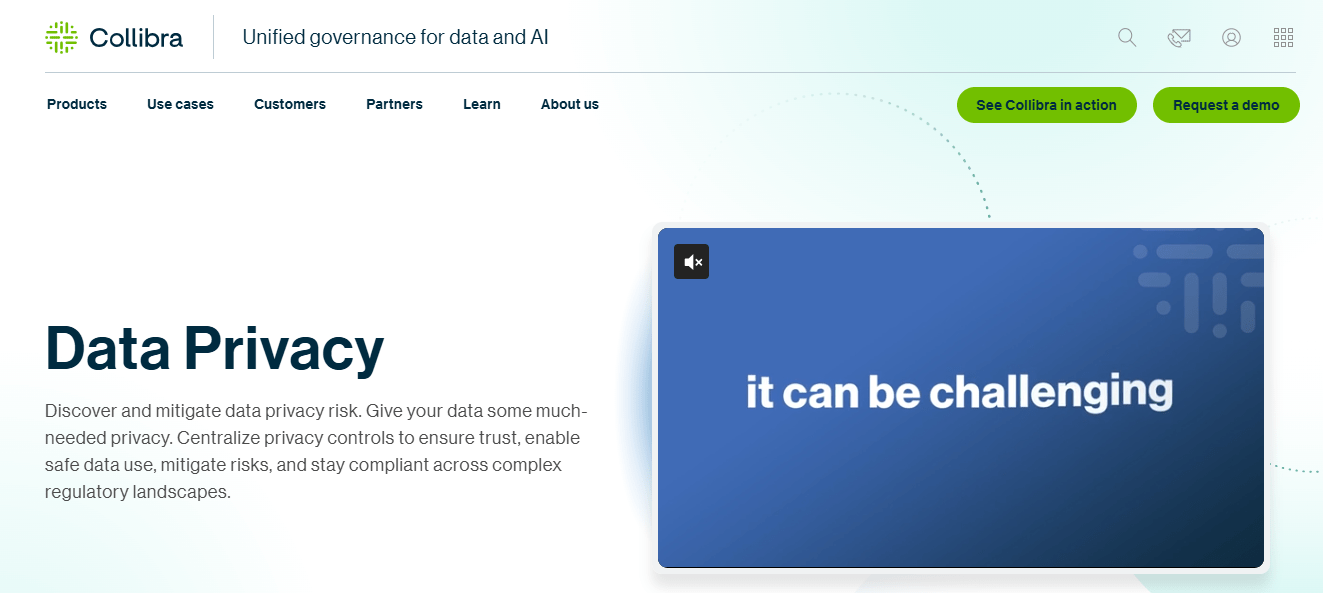
Collibra Data Privacy gives organizations control over privacy management by centralizing compliance policies, automating workflows, and identifying sensitive data. It enforces governance across regulatory frameworks and ensures safe, compliant data use.
Collibra provides automated visibility, control, and tracing from data input to output. It documents and tracks data for AI use cases to enhance observability, security, and reliability. Its enterprise metadata graph enriches data context, while the user interface allows both technical and business users to access, manage, and steward data effectively.
Features
- Centralized privacy controls and compliance enforcement
- Comprehensive metadata management and cataloging
- Data lineage tracking and impact analysis
- Automated privacy workflows and documentation
- Policy management with automated enforcement
- Integration with major data platforms (e.g., Snowflake, Airbyte)
Pros
- Excellent metadata management capabilities
- Strong data lineage and impact analysis
- Comprehensive policy management features
- Effective integration with modern data stacks
- Enriched data context through enterprise metadata graph
Cons
- Very steep learning curve and complexity
- Expensive, enterprise-level pricing
Pricing
Collibra does not publish standard pricing.
You must request a personalized demo or contact the sales team directly.
3. Enzuzo
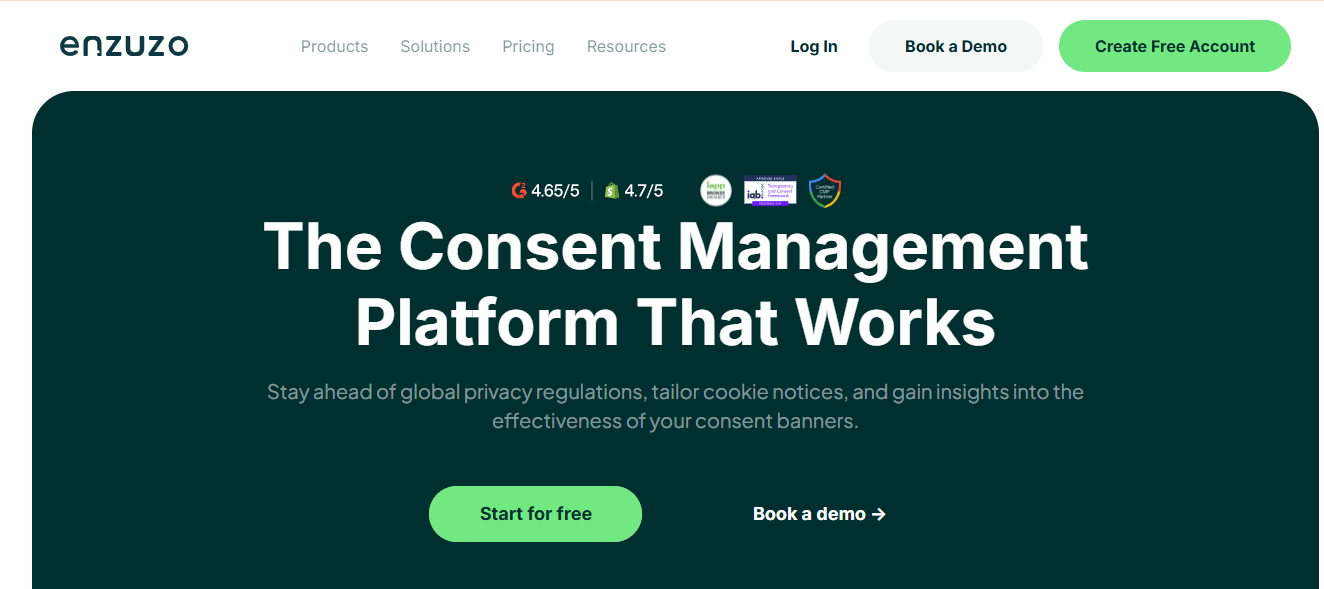
Enzuzo provides a global compliance platform that enables businesses to meet GDPR, CCPA, LGPD, and Quebec Law 25 requirements. Known for simplicity, it serves as an accessible solution for small and mid-sized businesses. The platform covers essential aspects of privacy compliance, including generating compliant policies, managing cookie consent, and automating data subject requests (DSARs).
Features
- Generate privacy policies and terms of service tailored to business location and sector.
- Manage cookie consent with tools that allow users to accept, decline, or adjust preferences.
- Automate DSARs for data access, deletion, and correction requests.
- View compliance status clearly through a user-friendly dashboard.
- Connect easily with website builders and ecommerce platforms for fast setup.
- Access ready-to-use templates and resources for guidance on privacy best practices.
Pros
- Easy to set up and use.
- Affordable pricing across different tiers.
- Automated handling of DSARs.
- Seamless integration with popular website builders.
Cons
- Limited customization on the free plan.
- Lacks advanced features found in enterprise-grade platforms.
Pricing
- Free Plan: Basic privacy policy and cookie banner.
- Starter: $9/month: Unlimited DSARs, advanced consent management.
- Growth: $29/month: Integrations and analytics.
- Pro: $79/month: Weekly cookie scan, 5 users, 10 domains, up to 30,000 monthly visitors.
- Enterprise: Custom Pricing
4. BigID
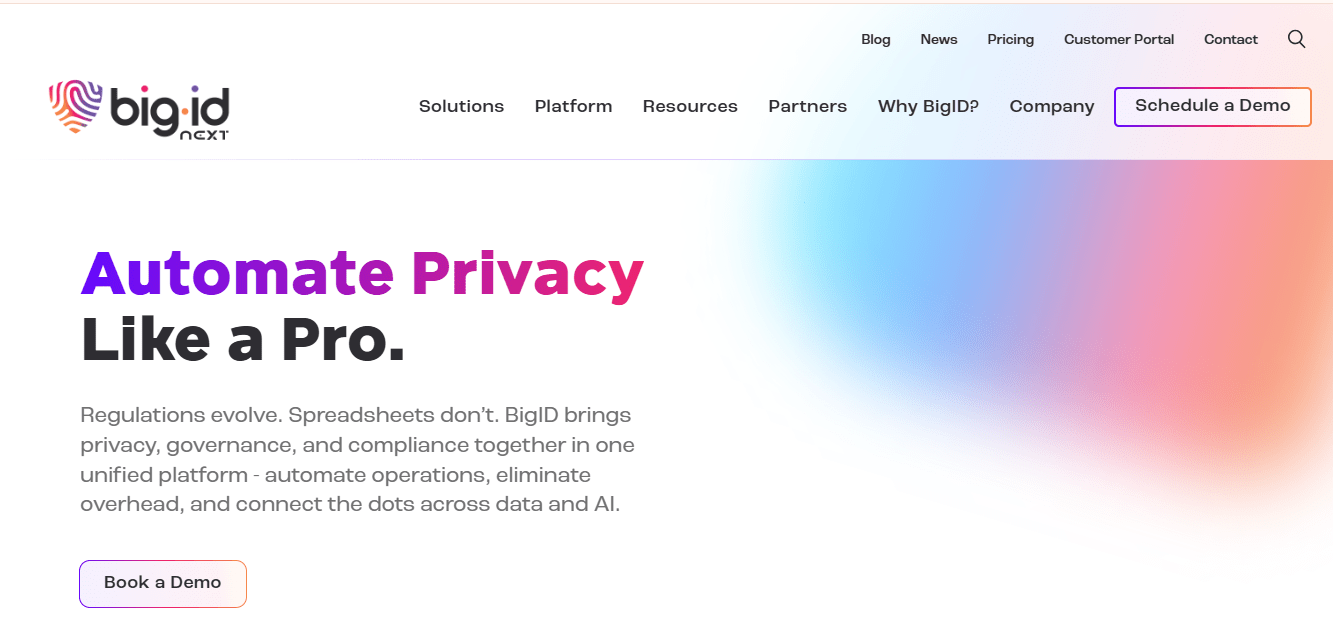
BigID is a data intelligence platform that uses machine learning to help organizations discover, classify, and manage sensitive and personal data across their environments. It enables compliance with data protection laws such as GDPR, HIPAA, and CCPA by providing visibility into data assets, automating compliance processes, and supporting privacy-driven decisions.
Features
- Identifies and categorizes personal data automatically across both structured and unstructured data sources.
- Fulfills data subject requests automatically, including access, deletion, and correction.
- Detects and evaluates data privacy risks based on sensitivity, location, and usage patterns.
- Defines and enforces retention policies to cut storage costs and reduce compliance risks.
- Automates the detection and mitigation of potential privacy risks.
Pros
- Reduces manual effort by automatically identifying and categorizing personal data.
- Strong automation for handling data rights and risk assessments.
- Integrates comprehensively with multiple types of data sources.
Cons
- Requires specialized expertise for effective setup and use.
- High pricing may pose challenges for smaller organizations.
Pricing
- Available on request.
- Cost typically depends on the number of data sources and the volume of data being managed.
5. TrustArc
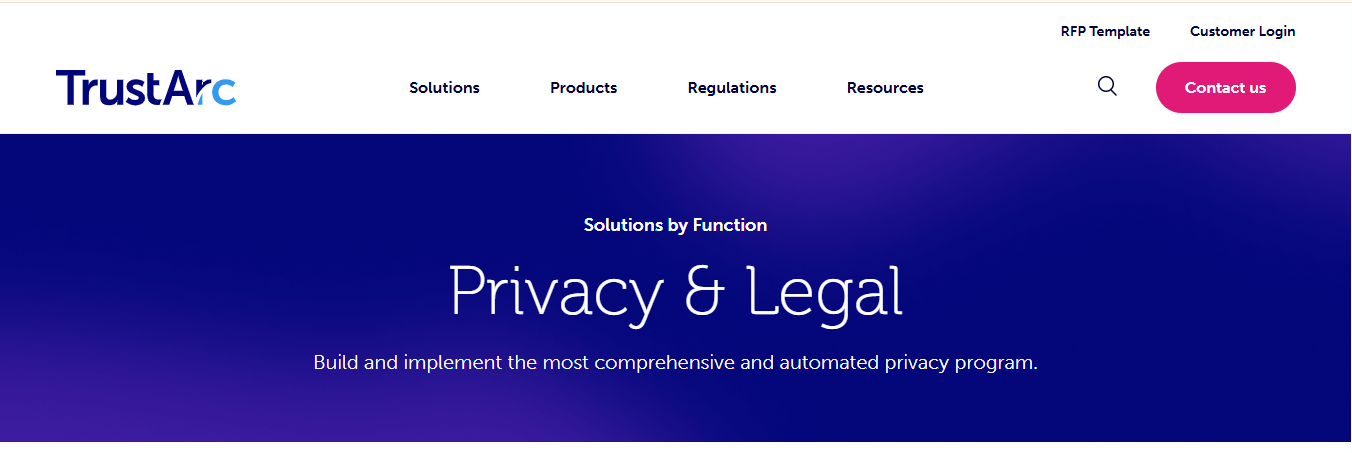
TrustArc is a data privacy and compliance software that helps businesses meet GDPR, CCPA, and other global privacy regulations. It allows organizations to assess privacy risks, manage consent, track data processing activities, and handle compliance tasks effectively. Companies can use TrustArc to manage data subject requests, conduct data protection impact assessments, and monitor vendor compliance.It reduces the risk of non-compliance and penalties by automating manual processes. Its intuitive interface and customizable dashboards support businesses of all sizes in protecting customer data and preventing privacy breaches.
Features
- Cookie consent and preference management
- Privacy impact assessment templates and workflows
- Data subject request tracking and automation
- Compliance support for global privacy regulations
Pros
- User-friendly interface with quick setup
- Effective cookie and consent management capabilities
- Reasonable pricing for mid-market organizations
- Strong integrations with marketing platforms
Cons
- Limited advanced data governance features
- Less suitable for large and complex enterprise environments
- Fewer integrations compared to enterprise-grade platforms
- Limited data discovery and classification features
Pricing
- Contact vendor for pricing details
6. DataGrail
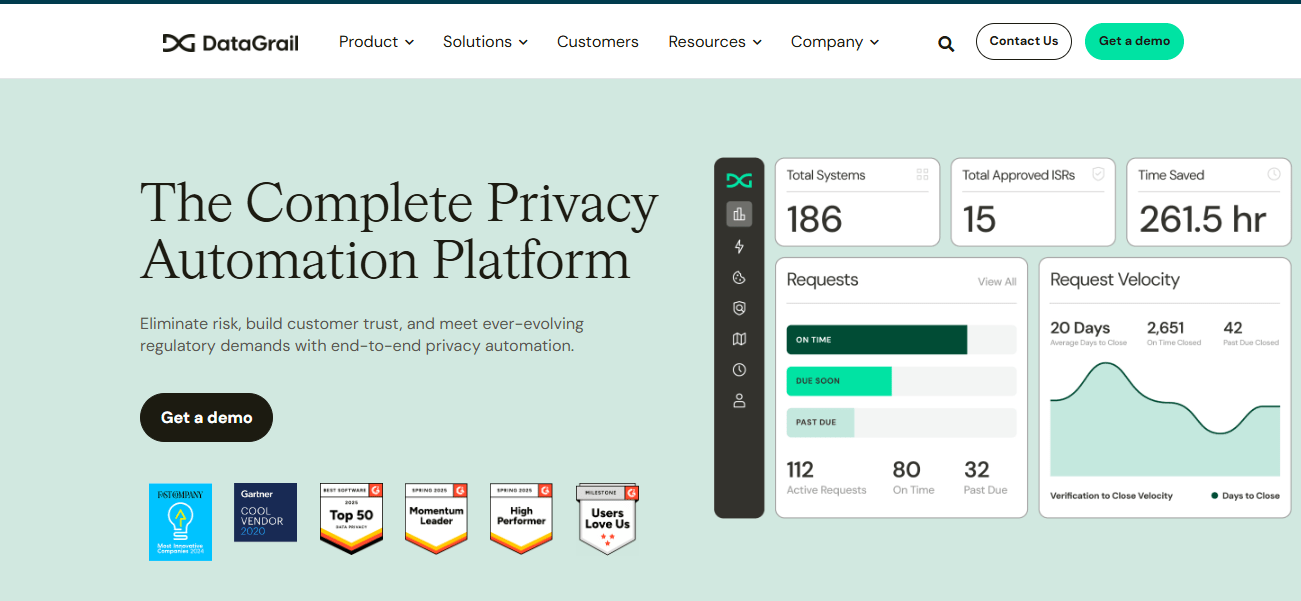
DataGrail simplifies DSARs and vendor risk management, helping organizations manage data privacy with greater efficiency. Companies use its intuitive platform to automate compliance workflows and improve daily operations. The software integrates with numerous third-party applications, enabling teams to quickly locate and manage consumer data across multiple sources.
The platform synchronizes data in ensuring records remain current and reducing the risk of non-compliance. Its user-friendly interface supports privacy teams that prioritize accessibility and ease of use, particularly in fast-growing organizations with large vendor ecosystems.
Features
- Automates privacy workflow management
- Processes and tracks data subject requests (DSARs)
- Provides consent management and preference centers
- Integrates with dozens of SaaS tools and systems
- Monitors privacy proactively with alerts
- Offers customizable compliance dashboards and reporting
Pros
- Automation reduces manual privacy tasks
- Strong SaaS tool integrations
- Easy-to-use interface with quick setup
- Cost-effective for mid-market privacy operations
Cons
- Limited advanced data governance features
- Less effective for complex enterprise environments
- Fewer customization options than enterprise platforms
- Limited capabilities for data discovery and classification
Pricing
- Contact for demo
7. Privacera
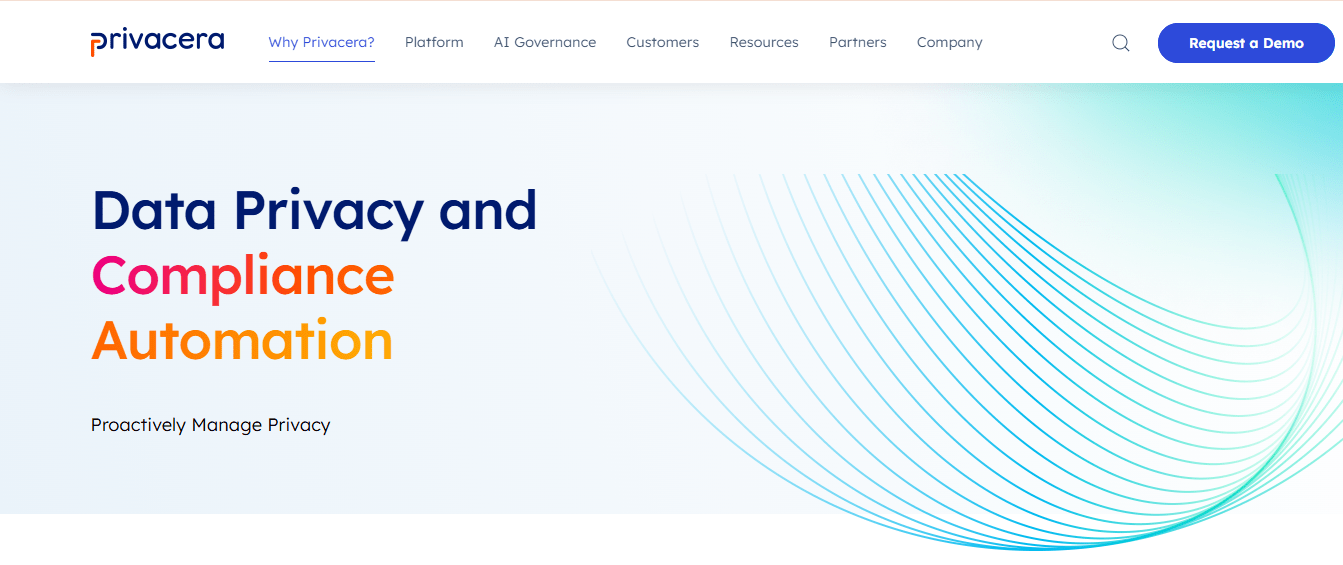
Privacera enforces access controls across cloud and hybrid data environments. Built on Apache Ranger, it delivers fine-grained access control, data masking, and encryption to meet strict privacy regulations. Its SaaS-based unified platform offers data privacy, security, and governance.
Privacera also introduced Privacera AI Governance (PAIG), the first industry solution dedicated to AI data security governance. With its centralized platform, Privacera helps organizations democratize data access while ensuring compliance with global regulations such as GDPR, CCPA, LGPD, and HIPAA.
Features
- Fine-grained access control across cloud and on-premise platforms
- Data masking and encryption
- Built on Apache Ranger foundation
- Integration with consent management platforms
- Audit trails and compliance-ready reporting
Pros
- Provides excellent fine-grained access control
- Uses a strong and proven Apache Ranger foundation
- Handles large-scale data with solid performance
- Offers flexible policy enforcement options
Cons
- Requires deep technical expertise
- Involves complex setup and configuration
- Offers limited prebuilt privacy workflows
- Focuses primarily on access control rather than broader privacy needs
Pricing
Contact for demo
8. Drata
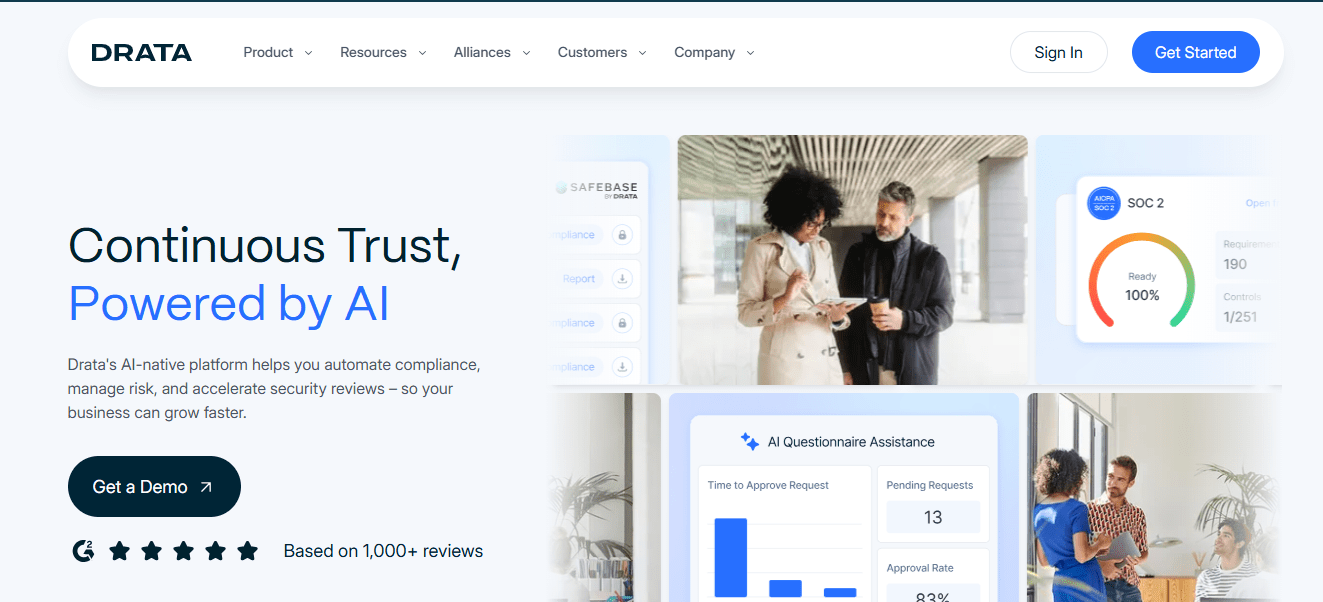
Drata is a compliance management system that automates processes for achieving compliance with specific standards and maintaining data governance. It minimizes human error by using workflows and automation.
When organizations adopt one of the supported data privacy standards, Drata facilitates communication with vendors through third-party risk assessments. The platform generates digital questionnaires, collects vendor responses, and scores them. These results contribute directly to the organization’s overall compliance health score.
Features
- Provides continuous monitoring for real-time visibility into security posture and compliance status
- Automates evidence collection to reduce manual work and speed up audit preparation
- Offers a centralized dashboard to manage multiple compliance frameworks in one place
- Integrates with 55+ tools including cloud providers, identity management, and version control systems
Pros
- Automates complex compliance tasks and evidence collection, saving significant time
- Supports multiple regulatory frameworks and allows customization with controls
- Enables continuous monitoring for ongoing compliance and audit readiness
Cons
- Offers specialized integrations, but users report a need for more integration options
- Some users note the absence of certain key features
- Advanced features are restricted to higher-tier plans
Pricing
- Contact vendor for pricing details.
9. Securiti
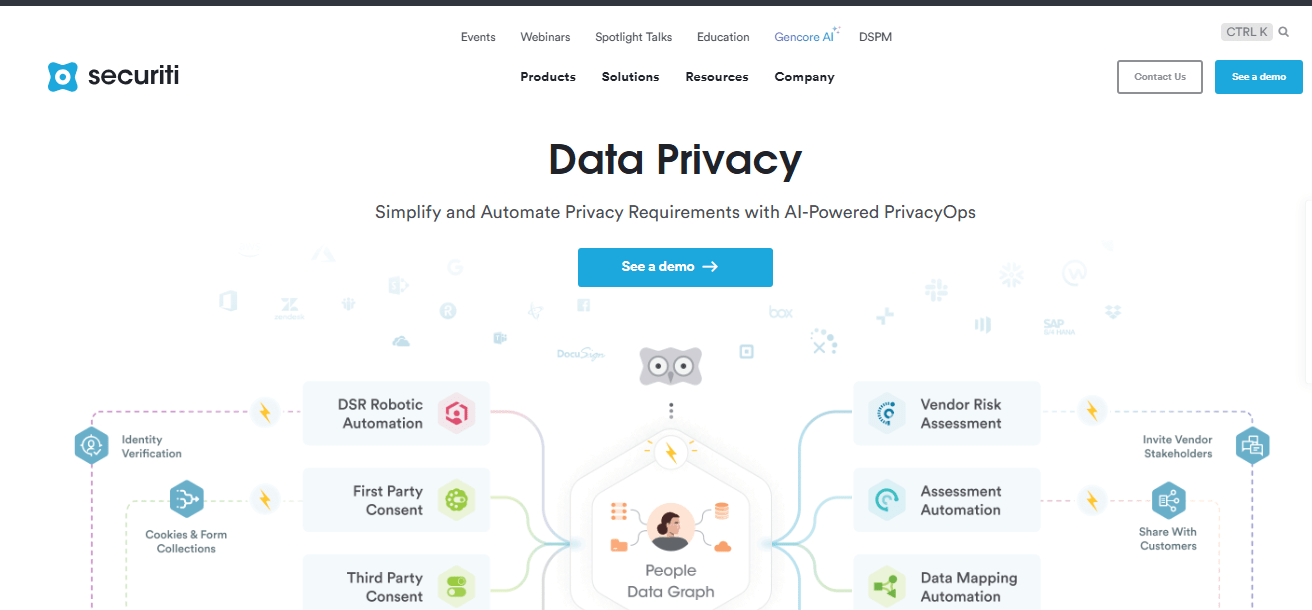
Securiti provides a privacy and data security automation solution that supports security, governance, and compliance across on-premise, hybrid, and multi-cloud environments. Its modular platform helps organizations discover, protect, and manage sensitive data while addressing compliance requirements.
Features
- Identifies and classifies sensitive information across different environments.
- Monitors and manages data access to maintain compliance.
- Evaluates security health and highlights risks for remediation.
- Automates workflows to reduce privacy risks.
- Handles third-party risk management to assess vendor compliance.
Pros
- Offers affordable implementation and management costs.
- Provides user-friendly dashboards with clear data visibility.
- Includes technical documentation and dedicated customer support.
Cons
- Lacks API key authentication.
- Does not include built-in analytic capabilities.
- Presents challenges when deploying at scale.
Pricing
Request Demo.
10. Vanta
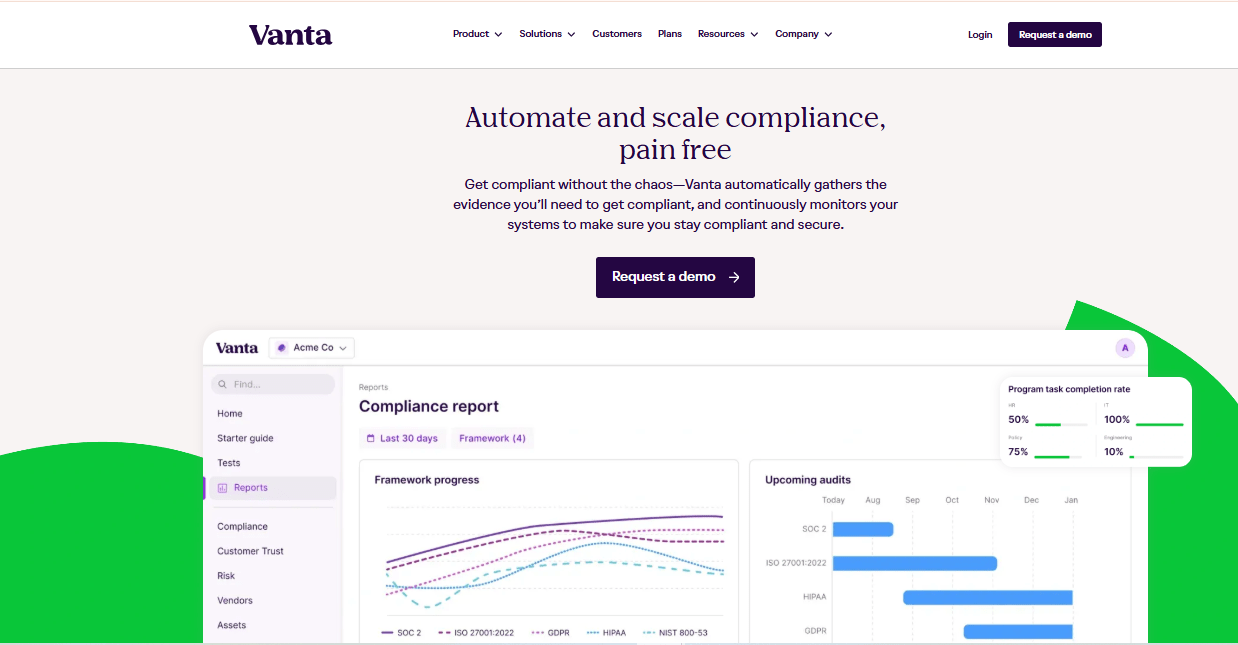
Vanta delivers automated security and compliance solutions designed to help businesses achieve SOC 2 compliance. The platform reduces the manual effort needed to maintain security standards by automating critical compliance tasks. Companies use Vanta to monitor systems continuously, perform automated checks, and act on clear insights that improve their compliance posture.
Features
- Runs a network scan to document all endpoints, followed by device-by-device checks for installed software packages.
- Focuses on application security weaknesses rather than sensitive data exposure.
- Provides automated vulnerability scanning that checks patch status for operating systems and applications.
- Combines automated discoveries with manual data inputs and questionnaires to calculate a risk score.
- Displays a dashboard with a prioritized to-do list, guiding businesses on how to improve their risk score and reach compliance.
Pros
- Automated checks reduce manual work in SOC 2 compliance processes.
- Continuous monitoring offers real-time oversight of security posture.
- Actionable insights help teams identify vulnerabilities and prioritize fixes.
Cons
- Learning curve exists due to Vanta’s specific focus on SOC 2 standards.
- Integration limits mean some platforms remain unsupported.
Pricing
- Available on request for demo
The question is no longer whether to implement privacy compliance software, but which solution best aligns with your organization’s current needs while providing the flexibility to adapt to future privacy challenges. In an era where data breaches make headlines and privacy regulations multiply globally, the right privacy compliance platform serves as both shield and strategic advantage, protecting what matters most while enabling innovation and growth.

